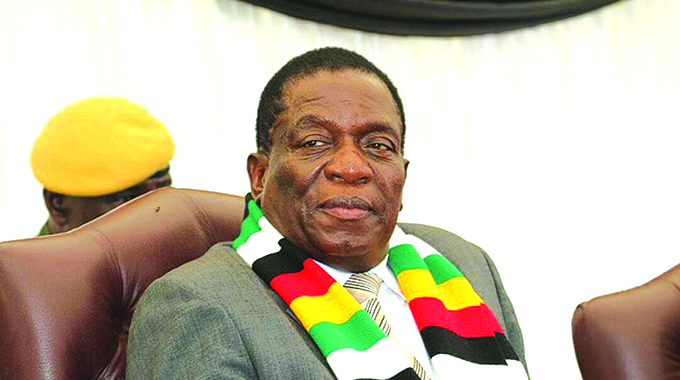‘Gold coins a masterstroke’

Farirai Machivenyika Senior Reporter
THE introduction of gold coins by the Reserve Bank of Zimbabwe (RBZ) has been a masterstroke, as it has brought the equivalent of US$27,5 million into the formal system and helped in the economic turnaround drive, President Mnangagwa has said.
Since the introduction of the gold coins last year, 28 000 of them have been sold, removing $22,2 billion (US$27,5 million) from the market and helping to reduce liquidity.
In the process, an overhang of local currency that before the coins were introduced might have fuelled the black market was also accounted for.
Writing in his weekly column in the Sunday Mail yesterday, President Mnangagwa hailed the Reserve Bank of Zimbabwe for its policies that have stabilised the economy and set it on a growth path.
“Our banking institutions are in fine fettle. Our financial market is growing in depth, with new instruments being brought to bear, and making any surpluses investible. In this regard, the introduction of gold coins has been outstanding.
“To date, some 28 000 coins have been sold, raising some $22,2 billion, or US$27,5 million. Until now, all this money was either stashed at home, or was wreaking havoc in our economy through illicit parallel market-related activities,” President Mnangagwa said.
He added that the Monetary Policy Statement recently announced by the RBZ Governor, Dr John Mangudya, showed the robustness of the economy evidenced by increased foreign currency receipts.
“Set against likely trends in the global economy, the Governor’s statement confirms that Zimbabwe’s economic activity remains robust, supported by strong foreign currency receipts,” President Mnangagwa said.
“It discloses that our total foreign currency receipts reached US$11,6 billion in 2022, the highest ever in the history of our country, and certainly since our independence.
“The country’s balance of payment position remains in surplus position, driven by robust export performance and remittances. Our foreign currency receipts of more than US$11,6 billion serviced our external payments of about US$8,6 billion.
“Diaspora remittances increased by 14 percent in 2022, to US$1,66 billion. The foreign currency auction backlog meant to support business has been cleared, while the willing-buyer, willing-seller mechanism is working very well and reinforcing the foreign currency auction system.”
President Mnangagwa said the good rains that the country has received so far further brightened the economic prospects for the country.
“The rains have favoured us. This, alongside the extensive climate-proofing measures we have adopted as an agriculture-led economy, means we are set to have a good season, itself a key factor to our overall growth. The mining and tourism sectors are doing very well, thus making our growth prospects not just good, but also quite sustainable,” he said.
“Month-on-month inflation, which peaked at 30,7 percent in June 2022, decelerated to less than 2,5 percent by end of 2022. The upward trend of inflation has now been checked, with current efforts focusing on bringing it down even much further.
“The exchange rate has largely stabilised, putting aside temporary instability late last year triggered by payment to our farmers. That we are on course, and that the outlook is sustainably good, showed by way key of relaxation measures and concessions the Governor made to businesses, and to the general public.
“That is as it should be. Every gain we make as an economy must translate to a better operating environment for businesses, and to improved welfare thresholds for the generality of our people.”
President Mnangagwa also cautioned that despite the positive outlook for the economy, the country has to remain focused to maintain the gains made thus far.
“Amidst all this good news, there are issues and concerns which we must continue to keep an eye on, and even address as an economy. First, the more than US$300m positive balance between our foreign exchange receipts and our external payment commitments must continue to be monitored so they do not upset the applecart.
“I am aware that over 70 percent of domestic transactions are in US dollars and cash-based. That, in part, explains where this surplus is, and what it is doing in the economy. I urge both the fiscal and monetary authorities to jointly ensure this huge amount remains in lawful circulation and positively used at all times. It should never live and operate in the twilight of national laws and national transactions,” he said.








Comments